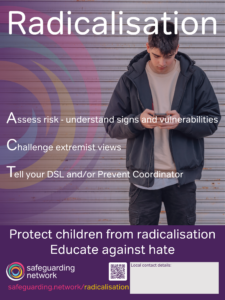Introduction
With increasing concerns about the radicalisation of young people, there is a need to actively challenge extremist views and prevent young people being drawn into terrorism. Keeping children safe from harm includes keeping them safe from extreme ideologies and behaviours.
As organisations working with children and young people, we must have an awareness of the potential influences of extremist ideology and the risks of radicalisation. This means knowing the children and young people you work with well, and understanding the dynamics of peer groups, their families and the local community (see contextual safeguarding).
To counter the risks, we can promote positive discussion and adoption of the fundamental values of tolerance, respect, liberty and the rule of law through role-modelling and direction.
Need more?
Thank you for visiting our resources pages. These are free to everyone as is our fortnightly safeguarding bulletin – general safeguarding information is too important to restrict. Become a member to access lots more, including training materials for you to deliver in-house on each topic in Keeping Children Safe in Education.
Sign up for FREE fortnightly bulletin.
What about training?
We can deliver training for your setting on this and other subjects via online platforms, or face-to-face in certain areas. Just get in touch to discuss your requirements.
Definition of radicalisation
“… the process by which a person comes to support terrorism and extremist ideologies associated with terrorist groups.”
The government strategy to combat terrorism is known as CONTEST. Within this wider strategy is the Prevent duty which has three specific strategic objectives:
- tackle the ideological causes of terrorism;
- intervene early to support people susceptible to radicalisation;
- enable people who have already engaged in terrorism to disengage and rehabilitate.
The government defines extremism as: “the promotion or advancement of an ideology based on violence, hatred or intolerance that aims to:
- negate or destroy the fundamental rights and freedoms of others; or
- undermine, overturn or replace the UK’s system of liberal parliamentary democracy and democratic rights; or
- intentionally create a permissive environment for others to achieve the results in (1) or (2).”
New definition of extremism (2024)
Terrorist groups often draw on extremist ideology. Some people who join terrorist groups have previously been members of extremist organisations and have been radicalised by them.
Spot the signs
Indicators that a child or young person is being radicalised may include:
- being overly secretive about their online viewing, spending increasing amounts of time online and sharing extreme views on social media and gaming platforms;
- expressing an ‘us and them’ mentality – a possible sign of a sense of social isolation;
- becoming more argumentative or domineering in their viewpoints and showing a desire to control others;
- being quick to condemn those who disagree and ignoring views that contradict their own;
- showing an obsessive or angry desire for change or ‘something to be done’;
- blaming others/groups of people for things not turning out as wanted or demonstrating feelings of rejection;
- questioning their faith or identity or a sudden, unexplained religious conversion;
- downloading or promoting extremist content;
- becoming socially isolated or acquiring a high number of new friends;
- altering their appearance – e.g., a change in style of dress.
Additional vulnerabilities
All children and young people are at risk, regardless of age, social class, religion, ethnicity or educational background. However, certain children are more vulnerable to radicalisation, including those who are:
- struggling with a sense of identity and belonging;
- becoming distanced from their cultural or religious background;
- questioning their place in society;
- having family issues;
- experiencing/have experienced a traumatic event;
- experiencing mental ill-health;
- experiencing racism or discrimination;
- having difficulty interacting socially and lacking empathy;
- not always understanding the consequences of their actions;
- presenting with poor self-esteem.
What to do
If someone is exhibiting one or more of these signs, it still doesn’t necessarily mean that they are being radicalised – e.g., changes in views and behaviour may be part of a child or young person growing up and learning more about the world around them or wanting to make their mark. Be calm, open, and non-confrontational so that you encourage them to share their ideas and opinions with you.
Concerns should then be addressed through your setting’s reporting procedures; this may be via your DSL or specified Prevent Lead who will inform the local Prevent team. The Prevent team will follow a process of screening, and assessment if the person is felt to be at risk of radicalisation (whatever faith, ethnicity or background they are), a multi-agency Channel panel discussion may take place and appropriate intervention agreed. Once this is in place, there will be review meetings to decide if further support or action is needed. You may be asked to be part of a Channel panel meeting.
Channel is about ensuring that vulnerable children and adults receive support before their vulnerabilities are exploited by those who want them to embrace terrorism. Support provided could include mentoring, theological guidance, careers assistance, diversionary activities such as sport, or signposting to mainstream services such as education, employment or housing.
Channel is voluntary, and people who are referred must give consent (via a parent or guardian if they are underage) before they can be given support.
Take action – and keep taking action until you know children and young people are safe.
Prevention
Settings should create an environment where radicalising ideologies are challenged and are not permitted to flourish. Settings should have measures in place to prevent their facilities being exploited by radicalisers, including ensuring that IT equipment is not being used to access/facilitate the spread of extremist narratives which encourage people to participate in or support terrorism, and assessing the potential risks of external speakers expressing such narratives. Filtering and monitoring systems should be regularly reviewed and updated.
The Prevent duty
Prevent work is intended to deal with all kinds of terrorist threats to the UK. The most significant of these threats is currently from terrorist activity linked to far right and Islamist extremists who pose a continued threat to our safety and security. There is also concern about other extremist groups, for example, extreme left-wing, environmental extremism, antisemitism, and extreme misogynist ideology.
Our responsibilities
- Settings should have a designated lead in a senior management role who is responsible for delivering Prevent.
- Settings should ensure that staff receive appropriate training (DSLs and/or Prevent leads should receive more in-depth training).
- We must ensure that there is reference to radicalisation as part of wider safeguarding duties.
- We must assess the risk to individual children as well as cohorts within settings.
- We must report concerns when necessary, co-operate with local authority-led Channel panels, and engage with other partners, such as the police and Prevent leads in local authorities.
- We should build resilience to radicalisation through the curriculum and promotion of fundamental British values.
We must be able to evidence safeguarding arrangements to promote pupils’ welfare and prevent radicalisation and extremism.
The Prevent programme provides training for frontline professionals to help them understand and implement the Prevent duty and protect vulnerable children in their care. (See resources section below.)
FREE radicalisation poster
This free, downloadable resource raises the profile of safeguarding for your staff team. For use in staff rooms, on safeguarding boards or on the back of toilet doors, the poster includes tips, a space for local contact details, plus a link and QR codes to this resource page. Download the poster from the resources below.
DSL Training Materials
-

Presentation
-

Presenter Notes
-

Handout for staff
-

Preventing radicalisation – Quiz
-

Preventing radicalisation – Quiz (Answer Sheet)
-

Preventing radicalisation scenario (Early Years)
-

Preventing radicalisation scenario (Early Years settings) – DSL Information sheet
-

Preventing radicalisation scenario (primary)
-

Preventing radicalisation scenario (primary) – DSL Information Sheet
-

Preventing radicalisation scenario (secondary)
-

Preventing radicalisation scenario (secondary) – DSL Information Sheet
-

Preventing radicalisation scenario (16+ settings)
-

Preventing radicalisation scenario (16+ settings) – DSL Information sheet
-

Preventing radicalisation scenario (SEND)
-

Preventing radicalisation scenario (SEND) – DSL Information Sheet
-

Preventing radicalisation scenario (care)
-

Preventing radicalisation scenario (care) – DSL Information Sheet
Resources
-

Preventing radicalisation poster
-

Educate against hate
-

Prevent duty guidance
-

Channel guidance
-

Introduction to PREVENT e-learning package
-

Prevent Duty advice for Early Years Settings
-

Prevent duty training: Learn how to support people susceptible to radicalisation
-

Managing risk of radicalisation in your education setting
-

Protecting charities from abuse for extremist purposes
-

ACT Early
-

How to protect children from online extremism
-

Addressing toxic masculinity, misogyny and social media influence
-

New definition of extremism
Save time and improve your safeguarding approach…
Bite-size training materials to share with your staff every month.
Support to explore and develop your safeguarding culture.
A huge array of resources and professional experience at your fingertips.
Get in touch now for a personal tour of the site and details of membership benefits.
We look forward to working with you.


